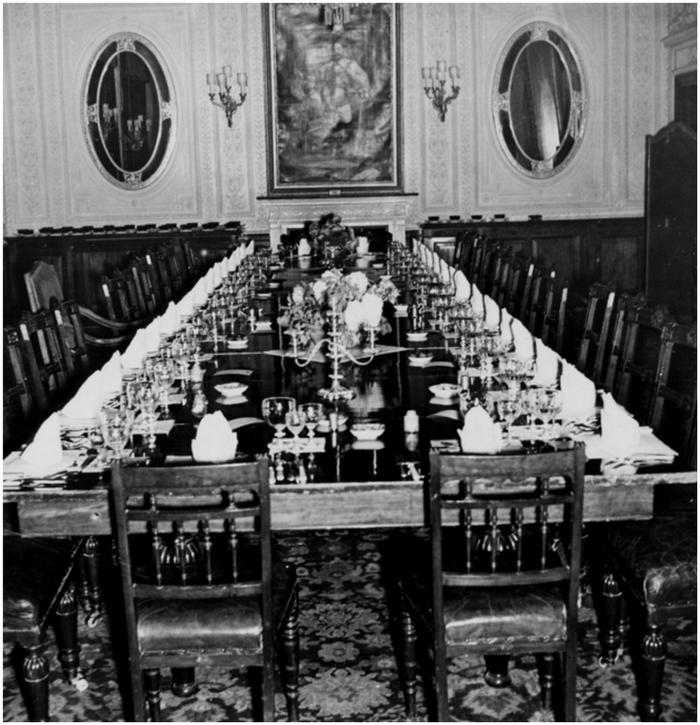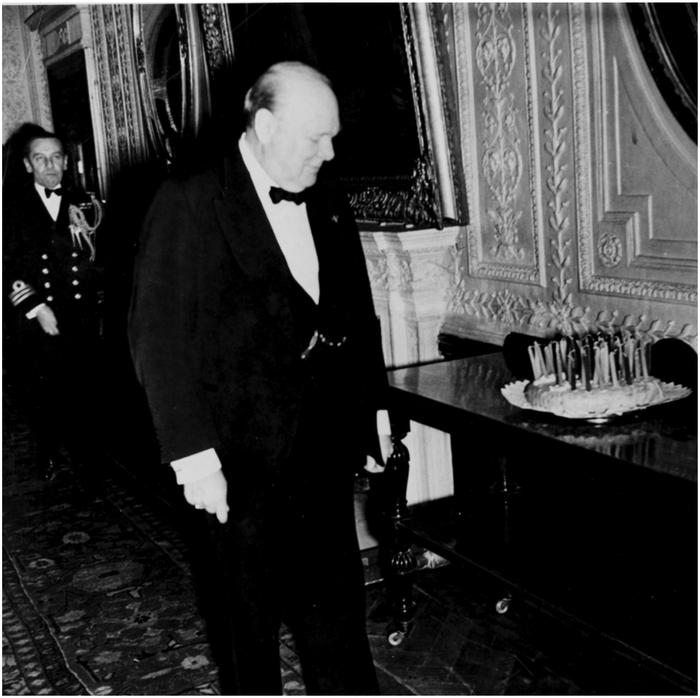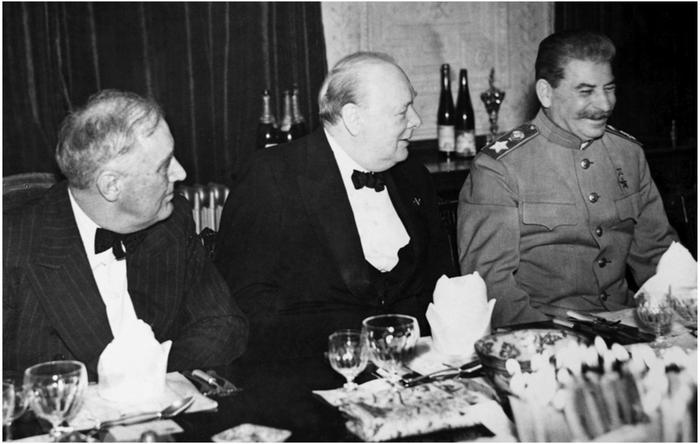Dinner With Churchill: Policy-Making at the Dinner Table (13 page)
Read Dinner With Churchill: Policy-Making at the Dinner Table Online
Authors: Cita Stelzer
Tags: #General, #Biography & Autobiography, #Military, #History, #World War II, #20th Century, #Europe, #World, #International Relations, #Historical, #Political Science, #Great Britain, #Modern, #Cooking, #Entertaining

“Do you think you could bring me a little bit of butter from that nice ship?”
1
“No more can be done here”
2
B
ritain had been at war for four years before Churchill had an opportunity to meet simultaneously with his American and Soviet allies. So he gladly headed for Teheran and the first Big Three conference – there would be two more at Yalta and Potsdam – despite the fact that it meant still another arduous journey. As always, he arranged a series of very useful meetings along the way. To Malta, aboard one of his favourite ships, the HMS
Renown
for a meeting with the Chief of Staff Committee; to Cairo, via Alexandria, for a meeting with Roosevelt and the Combined Chiefs of Staff; and then a flight to Teheran.
In Malta Churchill found the food at the Governor’s Palace not to his liking. He asked Lieutenant General Sir Hastings Ismay, his Military Secretary: “Do you think you could bring me a little bit of butter from that nice ship?” He complained that he only wanted “a cupful of hot water” for his bath “but could not get it”.
3
He did better in Cairo, where on 25 November,
Thanksgiving
Day for Americans, Roosevelt, also en route to Teheran, treated Churchill to a turkey dinner, carving the turkey himself.
4
Churchill, who had been too ill to preside at Cabinet
before
setting off on his trip, arrived in Teheran with a bad sore throat, so bad that he was unable to speak or to have dinner with the President.
5
Instead, “he had dinner in bed like a sulky little boy … practically no voice”,
6
reading
Oliver Twist
.
7
Cadogan said that Churchill had strained his voice staying up late in Cairo arguing with the Americans and “then expressed surprise at having a sore throat”.
8
It must have been an easier flight as he was flying in his new Avro York aircraft newly fitted out, for the first time, with a “grill, fast heaters for drinks, and a toaster”.
9
The housing situation at Teheran was complicated by a battle between Churchill and Stalin for access to the President. The short version is that the Prime Minister’s
invitation
to Roosevelt to stay at the British legation went
unanswered
, while Stalin’s request that Roosevelt stay in the Soviet embassy’s compound to foil an alleged assassination attempt (and facilitate bugging) carried the day, for two reasons. Roosevelt was eager to cement relations with an ally he had
never before met, and the plenary sessions were to be held in the Soviet compound, a convenience for the wheelchair-bound President.
The British were able to be of service to the President in one particular. When the Americans, expecting the President to stay at their own compound, built ramps
everywhere
, they inadvertently blocked the entrance to the
cellar
of the house’s official occupant, Louis G. Dreyfus. This serious problem was discovered only when Roosevelt asked for a whisky. Wisely, the Americans quickly sent out a
request
to the British legation and some eight cases of whisky appeared.
10
Another minor problem was that troops digging a protective trench in the British legation almost destroyed an important collection of Persian tulip bulbs collected and planted by the resident Oriental Secretary.
11
Churchill, visions of a Big Two forming in his mind, was unhappy but helpless to prevent the rearrangement of
living
quarters in line with Stalin’s, and very likely Roosevelt’s, wishes, especially since Stalin was able “to give the impression he was the host” by arriving first, earlier than announced,
12
and greeting the arriving Roosevelt at the American legation, before his move into the Soviet compound.
Churchill’s own base was at the British legation, built by the Indian Public Works Department. The British Minister was, by tradition, guarded there by “a small escort of Indian Cavalry for his personal protection”.
13
Its gardens adjoined the Soviet embassy. Major Birse, Churchill’s interpreter and an old Persia hand, noted men from Paiforce (Persian and Iraq Force) “… guarding the entrance gate and grounds. They were mainly men of the Buffs (as the Royal East Kent Regiment was known), and Indian troops”.
14
John S.D. Eisenhower called them Sikhs.
On 28 November, the leaders met in the late afternoon, the same timing as at previous meetings, a schedule now
traditional
for summits, and certainly favoured by Churchill. The mornings were set aside for staff meetings to work on the briefings and communiqués to be presented to the leaders for discussion at the plenary sessions, all of which took place in the Soviet embassy. There were daily meetings of what has been called the Little Three: Hopkins, Molotov and Eden, as well as of the military staffs. The American delegation was small, according to Harriman, in order to emphasise the
personal
nature of the meetings.
15
The formation of cordial and even intimate relationships was facilitated, with four people for each of the three countries attending, one of whom was an interpreter. The President enlisted “Chip” Bohlen to
interpret
Stalin into English, a chore somewhat more
demanding
than mere translation. Churchill depended on Major Birse, who, in his memoirs, makes clear his distrust of Stalin but could not allow any of his own misgivings to colour his translations.
Each leader gave a dinner, another tradition established at earlier summits. The President was the host at his villa within the Soviet compound on the first evening, and he had pride of place as he was the only head of state present. A steak and baked-potato dinner
16
was cooked up by his private “
indispensable
Filipino mess men from Shangri-La”
17
(now called Camp David, the presidential country retreat), with
cooking
and serving equipment borrowed at the last minute from a nearby US military base. Stalin was the host on the next night, 29 November, a smaller and more intimate dinner but one with lasting effect. Widely reported were the taunts and barbs that Stalin threw at the Prime Minister, aided by the President. A bad night for Churchill.
Churchill planned his own gala dinner on 30 November, his 69th birthday, promising himself a “glittering, never-
to-be
forgotten” party at the British legation.
18
That morning, the Chiefs of Staff had thought about singing happy
birthday
to the Prime Minister in his bedroom “in the forenoon” but “decided it was beyond our capability”.
19
As always, Churchill fretted over every detail of the
arrangements
for his own dinner, wandering through the British legation dressed in a dinner jacket, waiting for his famous guests and puffing on a cigar,
20
his mind probably turning over how he wanted the dinner conversation to
proceed
and what the best outcome would be. Then Roosevelt arrived with his son, Elliott, and was wheeled up the
improvised
ramp onto the first floor of the British legation, surrounded by grim-faced Secret Service personnel. Roosevelt, who had not thought beforehand of an appropriate
birthday
gift, detailed Harriman to find one. The gift is described by one source as a twelfth-century Kashan bowl hastily purchased from the private collection of the Metropolitan Museum curator who was stationed in Teheran,
21
while
another
says the bowl was bought quickly in a local bazaar.
22
Stalin arrived in a bad mood: he did agree to have his photograph taken under the British legation coat of arms, but turned down one of Roosevelt’s infamous cocktails,
refused
to shake Churchill’s hand,
23
and criticised the
confusion
created for him by the profusion of silverware. One of the British interpreters, Hugh Lunghi, remembers a “
complex
layout of cutlery”, and that it seemed to worry Stalin, who questioned Birse, Churchill’s personal interpreter, as to which to use when.
24
Clearly, Churchill’s table was “set with British elegance. The crystal and silver sparkled in the candlelight”.
25
The
dining-room table that Churchill used is now in storage as it was later deemed too wide for the ease of cross-table chat, which might explain why the Prime Minister sat Stalin and Roosevelt next to him rather than across the table.
Otherwise
, the room itself looks much as it does today, despite all the changes in Iran since then. There are the same side tables – on one of which Churchill’s cake would have been waited the lighting of its birthday candles.

Ready for the dinner guests at the British legation
In addition to the President’s son, Lieutenant Colonel Elliott Roosevelt, Captain Randolph Churchill and his
sister Sarah; FDR’s son-in-law Major Boettiger, and Harry Hopkins’ son, Robert; were all at the birthday dinner. In his memoirs, Churchill wrote that his two children were invited in after the dinner for the birthday tributes but
contemporary
photos clearly show Sarah sitting at the table, between two American admirals, Leahy and King. And the official seating chart lists their names.

Make a wish, 69th birthday
The photographs show only three glasses at each place,
two for wine and a smaller one for port. Perhaps the
champagne
glasses were handed round afterwards with the
birthday
cake. Or maybe this photo was taken before the table was completely set.

The Big Three, dining together for the first time, 1943
